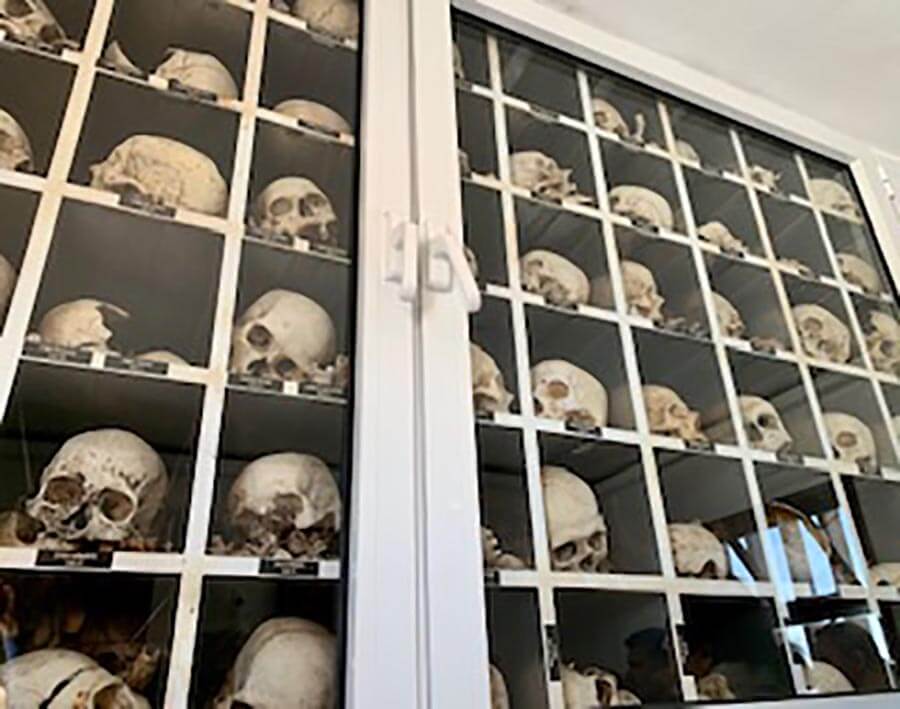ERETRIA, Greece — The sites of horror — the places where mass murder happened — are seared into my memory. Holocaust sites like the Warsaw Ghetto and Auschwitz, or Kigali, where the Hutus butchered the Tutus, or the Falls Road in Belfast, where many died over the decades of strife.
A new one has just been fixed firmly in my memory: Distomo.
These sites of slaughter trigger the sense of how fragile human society is — and such slaughter is taking place this day, this hour, this minute in Ukraine.
I am not enthralled by history per se. My lens is mainly confined to what happened in my lifetime, whether as a small child during World War II or the years since. That way, I know that it can and will happen again and again.
The horrors of the past aren’t confined to the past. They leak into the present as new bleak chapters on human conduct are written.
I say this because I have just visited Distomo, where barbarity reached a crescendo on June 10, 1944. There, for two hours, the Waffen-SS killed villagers with machine guns, bayonets and with any weapon at hand. They killed the unborn, infants and older children, women and men. They beheaded the village priest.
If they paused, it was to rape.
The Association of European Journalists, the 60-year-old organization with sections spread across Europe, had invited me to its annual congress in central Greece. After two busloads of delegates had visited the Oracle at Delphi, we stopped at Distomo: a trip from the celestial to the bestial.
My mind is set afire with questions at these World War II sites. If I had been a young Jew swept up by the Nazis, would I have been killed in a camp? If I had been a young German guard, would I have participated in the killing, and how much enthusiasm would I have brought to the work?
I wonder how the young men who did the butchery at Distomo lived with themselves afterward. Did they dream of bayonetting pregnant women, of old people begging to be killed instead of their spouses, children and grandchildren?
In the end, few were spared — only those who were left for dead. Conservative estimates are that 238 people died in the massacre.
My journalistic colleagues and I went from the foibles of the Greek gods of antiquity to the horrors of humans in the 20th century.
I was just a child during World War II, but I feel especially connected because this and other Nazi atrocities happened in my lifetime.
When I visited Auschwitz and saw the hair, the shoes, the toys and other jetsam of children, my thought wasn’t that it could have been me, but that those could have been my friends, my playmates, and every Jew I have been close to, and there have been many.
At the Distomo museum, they show a graphic film with eyewitness accounts of those who survived, those who bore witness, like the woman who describes scooping the brains back into her dead toddler’s head and carrying him home — but her house, and nearly all those in the village, was burned by the SS. That is what she did and lived to tell — to tell of that butchered child. She said in the film that she couldn’t forgive. Who with that memory could?
The young men who carried out the Distomo killings, under their 26-year-old leader, SS-Hauptsturmfurer Fritz Lautenbach, did so in reprisal for attacks on German troops.
After visiting many killing fields — and I don’t seek them out — I wonder what I would have done? Would I have followed orders? Would I, in seconds, persuade myself that what I was doing was right?
What would I do if I were on the Russian frontlines in Ukraine today? There is savagery equal to Distomo going on right now in wars in many places, carried out by people just like us.
Photo: Skulls of some of the villagers in Distomo, Greece, who were massacred by the Nazis on June 10, 1944. Linda Gasparello

 Follow
Follow
Leave a Reply